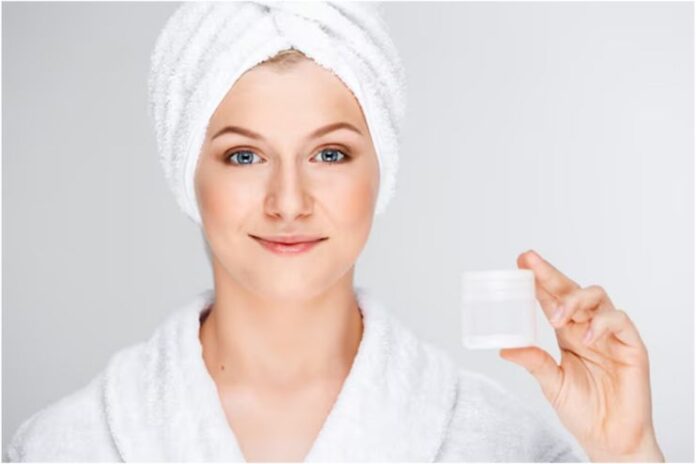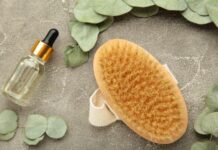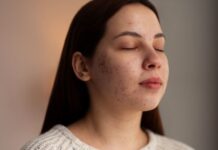Affiliate Disclaimer
Some links in this article are affiliate links. We may earn a small commission if you make a purchase through these links, at no extra cost to you. We only recommend products we find useful to our readersAre you searching for the secret to clear and healthy skin? If yes, you are at the right place. We have found the answer: probiotics.
Yes, you read that right. These good bacteria, a trusted tool for gut health, can also help your skin. People are increasingly relying on probiotics for clearer skin. These live beneficial bacteria are crucial in maintaining gut and skin health.
The skin is our body’s largest organ and hosts a diverse microbiome. When balanced, this microbiome helps protect the skin from various issues. By restoring balance to the skin’s microbiome, probiotics promise to tackle stubborn problems like acne, redness, and sensitivity at their root.
In this article, we will explore the growing popularity of probiotics for clearer skin, the correlation between gut health and acne, and a few tips on probiotic skincare.
What Are Probiotics?
Probiotics are live microorganisms, such as bacteria and yeasts, intended to have health benefits when consumed or applied to the body. Lactobacillus and Bifidobacterium are a few common strains.
- Lactobacillus:
A common probiotic found in fermented foods, such as yogurt. Lactobacillus acidophilus lessens the risk of bacterial vaginosis and prevents the growth of H. pylori, a bacterium that can lead to ulcers.
- Bifidobacterium:
A probiotic in some dairy products can help with irritable bowel syndrome (IBS). Bifidobacterium infantis and Bifidobacterium breve are common species found in healthy infants.
Though probiotics are usually associated with gut health and the immune system, these microorganisms also impact skin health (gut-skin axis). A healthy gut leads to clearer skin, helping prevent conditions like acne or eczema.
The Science Behind Probiotics and Clear Skin
As mentioned earlier, probiotics benefit skin health by regulating the skin microbiome and helping reduce inflammation significantly. For example, certain probiotics have been proven to improve the skin’s barrier function, reducing skin sensitivity and dryness. Additionally, probiotics help manage acne by preventing the growth of Propionibacterium acnes, the bacteria associated with acne development.
According to a study published in the International Journal of Molecular Sciences in 2023, oral supplementation with Lactobacillus plantarum dramatically improved participants’ skin hydration and elasticity. This study suggests a link between probiotic intake and enhanced skin barrier function.
Additionally, a clinical trial has shown that patients with acne vulgaris who were administered a probiotic supplement significantly reduced the number of acne lesions.
These studies highlight the impact of probiotics on promoting healthier skin. Probiotics support the skin’s natural defenses and maintain microbial balance.
Internal Probiotics: Foods and Supplements
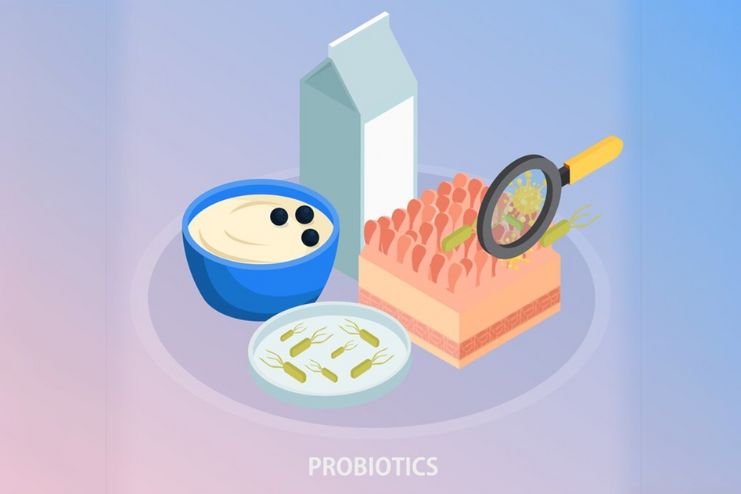
Including probiotic-rich foods in your diet helps you have a healthy gut and glowing skin. Here are a few foods with high probiotic content to help you achieve your health and skin goals:
- Yogurt: Yogurt is a common dairy product found easily across the globe. This fermented dairy product is rich in Lactobacillus strains. Usually known to have gut benefits, yogurt may also improve skin health. Yogurt is known to reduce skin inflammation and enhance the skin barrier. To know more, read our insightful article about the Top nine Yogurt Benefits for Your Skin.
- Kefir: Kefir is a fermented milk drink containing diverse probiotic bacteria and yeasts, which are beneficial for gut flora. Research suggests that kefir promotes skin hydration and reduces oxidative stress, which helps clear skin.
- Kimchi: A very popular Korean fermented vegetable dish, Kimchi is loved by many. It is primarily made from cabbage and radishes and is known for its high probiotic content. It has significant anti-inflammatory properties that help soothe acne-prone skin.
- Miso: Fermented soybeans are used as a seasoning, known as miso. This is a probiotic-rich dish and supports gut health. It is not just probiotics, but it also has a good amount of antioxidants, which, when coupled with probiotics, reduce redness and improve skin quality.
- Sauerkraut: This is a fermented cabbage that provides a substantial amount of beneficial probiotics and vitamins. This reduces conditions like eczema and inflammation.
By including the above foods in your diet, you can promote skin and overall health. These best probiotics for skin health cannot only nourish your gut but also reduce inflammation, improve your skin barrier, and give you radiant, clear skin.
A healthy gut can reduce inflammation, which is often linked to conditions like acne and eczema. Therefore, dietary probiotics are a key component of any holistic skincare routine.
If probiotic-rich foods for glowing skin are not an option, consider probiotic supplements.
These offer concentrated doses of beneficial bacteria. When selecting a supplement, consider strain specificity, colony-forming units (CFUs), and product viability. Consulting a healthcare professional can help determine the most suitable option.
Topical Probiotics: Are They Effective?
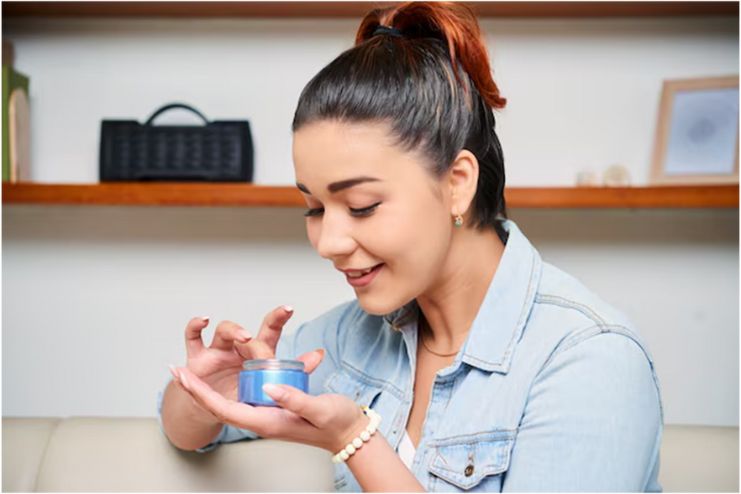
As mentioned earlier, probiotics are live microorganisms that benefit human health. Probiotic skincare or topical probiotics involve applying these microbes topically in products such as creams, cleansers, toners, or treatments. These help incorporate beneficial bacteria or probiotics to encourage microbial balance, essential for maintaining healthy skin.
Benefits of Topical Probiotics:
Topical probiotics strengthen the skin barrier, protecting against harmful bacteria and environmental aggressors.
- Probiotics like Lactobacillus and Bifidobacterium reduce inflammation and improve hydration levels, helping to soothe conditions like acne and eczema.
- Probiotics enhance the production of antimicrobial peptides, which naturally fight pathogens associated with skin irritation.
- By reducing the overgrowth of harmful bacteria, probiotics can calm breakouts and minimize redness, promoting a more transparent, smoother complexion.
Examples of Popular Probiotic Skincare Brands
Several brands are paving the way in probiotic skincare:
- ELEMIS: These probiotic-infused cleansers gently remove grime, deeply cleanse, and help maintain a healthy balance in the skin’s microflora, leaving the skin feeling hydrated and refreshed for a fresh, glowing complexion.
- Mother Dirt: Their sprays and serums contain live probiotics. Mother Dirt’s skincare restores the natural skin ecosystem.
- Cocokind: Cocokind has a variety of serums, sunscreens, and moisturizers that help us have healthy skin by maintaining the skin barrier. For example, their moisture-locking serum helps restore comfort to sensitive and sensitized skin while supporting a healthy skin barrier.
Are Topical Probiotics Worth It?
While the use of topical probiotics looks promising, it is essential to ensure the product is developed with proven strains. Instead, look for one containing ingredients such as Lactobacillus ferment, Bifidobacterium lysates, or prebiotic fibers to feed good bacteria. With more research needed to support their efficacy, evidence of the growing body of use and user testimonials have proven them very beneficial in any skincare, especially for those suffering from inflammation or sensitivity.
By embracing probiotic skincare, you’re not just treating your skin but nurturing its natural ecosystem. This approach bridges the gap between science and nature, making topical probiotics a powerful ally in the quest for radiant, healthy skin.
Potential Drawbacks and Risks:
While probiotics are usually safe, some people might experience side effects such as bloating or allergic reactions, especially when they introduce new supplements or skincare products. Moreover, we must fully understand their benefits and limitations before including probiotics in our regimen. It’s always a good idea to do a patch test with new topical products and consult a healthcare provider before initiating any new supplement regimen.
Tips for Incorporating Probiotics Into Your Routine
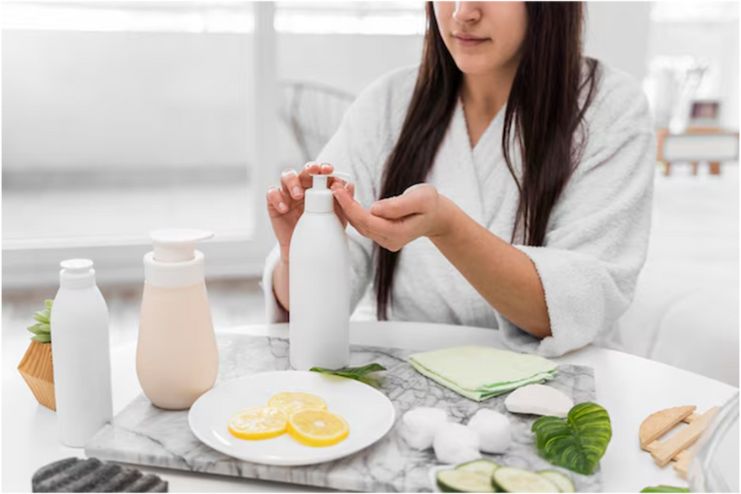
Including probiotics in your routine is a great way to have more explicit, healthier skin calls for internal and external applications.
To effectively include probiotics in your regimen, consider these tips:
- Dietary Integration: Include a variety of probiotic foods in your everyday diet, which would support both gut and skin health. Yogurt, kefir, kimchi, sauerkraut, and miso are rich in beneficial bacteria to balance the good flora in your guts. It has been noted that a healthy gut directly affects the skin. Inflammation will reduce and support your immune system by nurturing it from the inside out.
- Topical Application: Apply skincare products with probiotics, prebiotics, or postbiotics, with strains such as Lactobacillus or Bifidobacterium that minimize inflammation and enhance the strength of your skin barrier. Finding cleansers, moisturizers, and serums that contain these can be very beneficial in tackling environmental aggressors, soothing irritation, and improving hydration for smoother, brighter-looking skin over time. Topical application helps achieve radiant and glowing skin.
- Healthy Lifestyle: A good and healthy diet with abundant antioxidative powers and rich fat content, quality sleep, and stress management all impact gut health, which later shows skin manifestations: Adding moderate exercise to further reduce the factors of anxiety and contribute further to all-around health creates the ultimate environment for clear skin. Read this if you wish to know more about how stress affects the skin.
- Monitor Changes: Track your skin changes over time to know whether probiotics change your complexion. Whether you use probiotics through food, supplements, or topical products, you must track the improvements and challenges. You can keep a journal of flare-ups, hydration changes, or skin clarity. It will help you determine what works best for your skin and make the necessary adjustments in your routine.
Combining topical and dietary probiotics with a healthy lifestyle will promote your skin’s natural defense mechanisms, reduce inflammation, and lead to a more radiant and brighter complexion. Just be patient; it takes time because probiotics work gradually and slowly over time.
Conclusion:
Topical probiotics have changed the skincare game by using natural science to restore a healthy balance to our skin microbiome. Probiotics help by reviving and enhancing the skin and battling unhealthy pathogens. Adding Lactobacillus and Bifidobacterium to your routine can soothe inflammation, moisturize the skin, or even help in cases involving acne, eczema, or rosacea.
Probiotics not only combat bacteria but also strengthen the skin’s natural immunity through the induction of antimicrobial peptides. Thus, they effectively calm breakouts and irritation and provide a brighter, clearer complexion. Top brands such as Elemis, Mother Dirt, and Cocokind are already using the potential of probiotics to develop a line of skin-nourishing products.
Topical probiotics are a simple, powerful way to help your skin look and become its healthiest version.
References
- https://maystar.com/en/blogs/magazine/the-science-behind-probiotics-in-skin-care-beyond-trends
- https://pmc.ncbi.nlm.nih.gov/articles/PMC8955881/
- https://www.medicalnewstoday.com/articles/does-probiotic-skin-care-work-products-uses-and-more
- https://mylayers.com/blogs/our-blog-layer-by-layer/the-science-behind-probiotic-skincare-what-the-research-says
- https://renude.co/blog/ingredients/the-rise-of-probiotic-skincare-158
- https://pmc.ncbi.nlm.nih.gov/articles/PMC10385652/
- https://medicaljournalssweden.se/actadv/article/view/33206
In this Article















